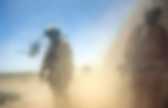

Iraq, lost in the fog of war. War, we are told, is a rational instrument of policy.
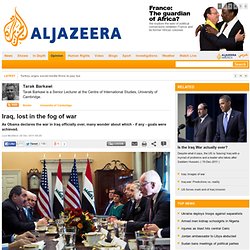
States go to war to achieve specific objectives. On such a view, determining the outcome of a war is a kind of bookkeeping exercise. One need only measure the results against the original purposes. But war is far too wily a beast to be made sense of by such simple calculations. War draws combatants, their societies and politics, into its vortex and forever changes them. Is the Iraq War actually over? New York, New York - Launched with so much bluster and zeal as a campaign - no, make that a crusade to save the world from invented WMDs - the Iraq War, we are told, is winding down.
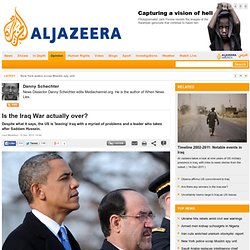
US soldiers are being shown the door amid claims that the only winner is Iraq itself. In a formal photo printed in the New York Times, President Obama, with hand over heart, poses with Iraq's Prime Minister Nouri al-Maliki at the Arlington National Ceremony and boasts of a "successful outcome''. "What we have now," he says, "is an Iraq that is self-governing, that is inclusive, and that has enormous potential".
'You got rid of one Saddam and you left us with 50' The image chosen by Charles Tripp to replace Saddam Hussein firing his gun into the air on the cover of the edition of his history of Iraq.
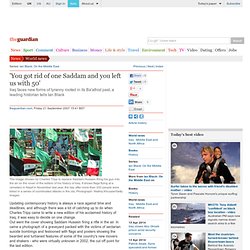
It shows flags flying at a cemetery in Najaf in November last year, the day after more than 200 people were killed in a series of coordinated attacks in the city. Photograph: Wathiq Khuzaie/Getty Images Updating contemporary history is always a race against time and deadlines, and although there was a lot of catching up to do when Charles Tripp came to write a new edition of his acclaimed history of Iraq, it was easy to decide on one change. Iraq refugee syria. They lived well in Baghdad; their eldest daughter had two cars.
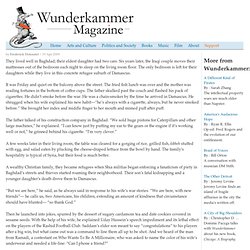
Rashid Khalidi on Iraq and America in the Middle East. Toxic legacy of US assault on Fallujah 'worse than Hiroshima' - Middle East - World. Iraqi doctors in Fallujah have complained since 2005 of being overwhelmed by the number of babies with serious birth defects, ranging from a girl born with two heads to paralysis of the lower limbs.

They said they were also seeing far more cancers than they did before the battle for Fallujah between US troops and insurgents. Their claims have been supported by a survey showing a four-fold increase in all cancers and a 12-fold increase in childhood cancer in under-14s. LRB · Anatol Lieven · The Push for War. The most surprising thing about the Bush Administration’s plan to invade Iraq is not that it is destructive of international order; or wicked, when we consider the role the US (and Britain) have played, and continue to play, in the Middle East; or opposed by the great majority of the international community; or seemingly contrary to some of the basic needs of the war against terrorism.
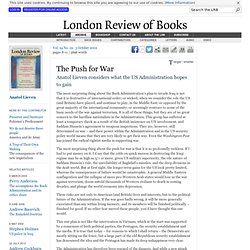
It is all of these things, but they are of no great concern to the hardline nationalists in the Administration. This group has suffered at least a temporary check as a result of the British insistence on UN involvement, and Saddam Hussein’s agreement to weapons inspections. They are, however, still determined on war – and their power within the Administration and in the US security policy world means that they are very likely to get their way. Asia Times - Asia's most trusted news source for the Middle East. THE ROVING EYEThe real fury of FallujahBy Pepe Escobar "The Romans create a desolation and call it peace.
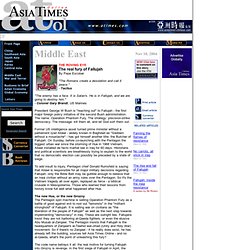
"- Tacitus. What is the US up to in Iraq? Imagine Dick Cheney's reaction when confronted with this bit of information.
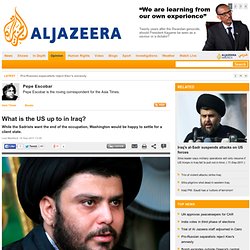
Shia cleric Muqtada al-Sadr, a certified Iraqi nationalist leader and the country's de facto kingmaker, has just called for the end of any "armed resistance" against US "invader" forces before a full US withdrawal in December 2011 - as established by the Status of Forces Agreement (SOFA) signed by the Iraqi parliament and the Bush administration in late 2008. The Death Squads. The torture and slaughter of Iraqi civilians is reaching unprecedented heights with estimates of up to 655,000 dead.
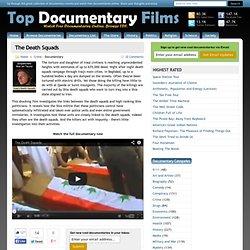
Night after night death squads rampage through Iraq's main cities. In Baghdad, up to a hundred bodies a day are dumped on the streets. Often they've been tortured with electric drills. Yet those doing the killing have little to do with al Qaeda or Sunni insurgents. Carne Ross explodes the Chilcot inquiry's cosy consensus. Carne Ross is a man with too much to say to mince his words.
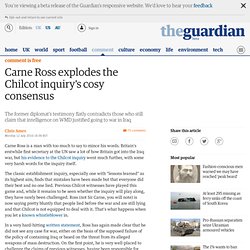
Britain's erstwhile first secretary at the UN saw a lot of how Britain got into the Iraq war, but his evidence to the Chilcot inquiry went much further, with some very harsh words for the inquiry itself. The classic establishment inquiry, especially one with "lessons learned" as its highest aim, finds that mistakes have been made but that everyone did their best and no one lied. Previous Chilcot witnesses have played this game and, while it remains to be seen whether the inquiry will play along, they have rarely been challenged.
Ross (not Sir Carne, you will note) is now saying pretty bluntly that people lied before the war and are still lying and that Chilcot is not equipped to deal with it. That's what happens when you let a known whistleblower in. Ross said it was "inaccurate to claim, as some earlier witnesses have done, that containment was failing and that sanctions were collapsing". Ah, the documents. Diplomat's suppressed document lays bare the lies behind Iraq war - UK Politics, UK. A devastating attack on Mr Blair's justification for military action by Carne Ross, Britain's key negotiator at the UN, has been kept under wraps until now because he was threatened with being charged with breaching the Official Secrets Act. In the testimony revealed today Mr Ross, 40, who helped negotiate several UN security resolutions on Iraq, makes it clear that Mr Blair must have known Saddam Hussein possessed no weapons of mass destruction.
He said that during his posting to the UN, "at no time did HMG [Her Majesty's Government] assess that Iraq's WMD (or any other capability) posed a threat to the UK or its interests. " Mr Ross revealed it was a commonly held view among British officials dealing with Iraq that any threat by Saddam Hussein had been "effectively contained". Colin Powell regrets Iraq war intelligence - Americas. Colin Powell, the former US secretary of state, has said he regrets providing misleading intelligence that led the US to invade Iraq, believing it had weapons of mass destruction.
Oil-Soaked Politics: Secret U.K. Docs on Iraq » New Deal 2.0. This just in: big oil companies and government ministers had discussions one year before invasion. NY Fed's $40 Billion Iraqi Money Trail. Iraq for Sale: The War Profiteers. Nir Rosen on the "Aftermath" of America's wars - Glenn Greenwald. (updated below w/transcript – Update II) Nir Rosen, currently with NYU’s Center on Law and Security, is one of the best war journalists in the world. Since 2003, he has spent substantial time — always unembedded — in Iraq and Afghanistan, as well as other nations in the region directly affected by American wars (Syria, Egypt, Jordan).
Few people have as effectively given voice in the Western World to the impact which these wars have on those who live there. Rosen has now written an amazingly good and moving book, which I read this month, that narrates — from both a geopolitical and very personal perspective — the havoc, misery, chaos, instability and pure evil these wars have unleashed: Aftermath: Following the Bloodshed of America’s Wars in the Muslim World.
Rosen is my guest today on Salon Radio to discuss the book and recent developments in Iraq and Afghanistan. [audio src='